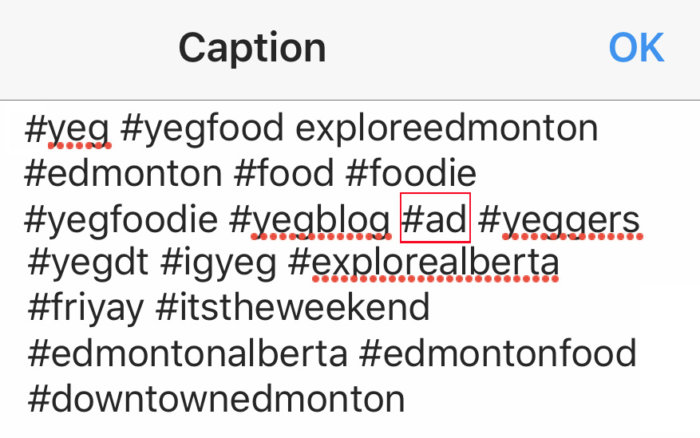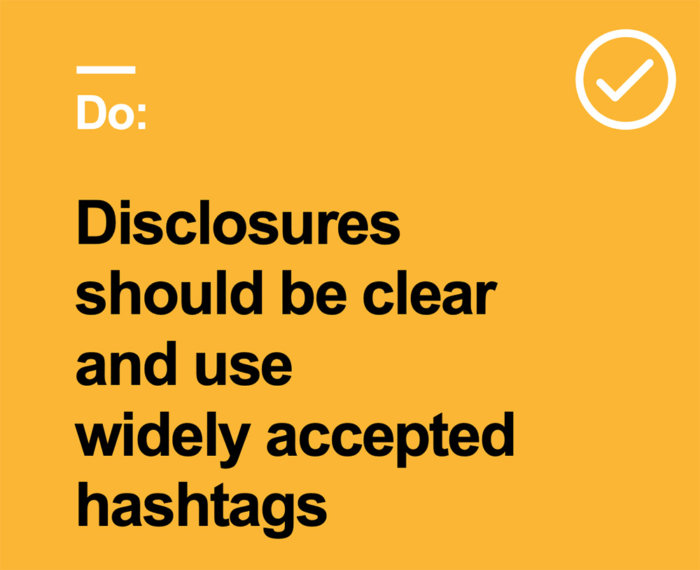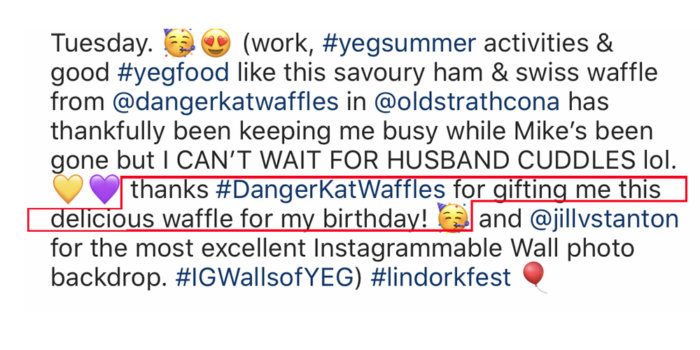ABOUT THE INFLUENCER MARKETING BLOG POST EDUCATION SERIES
This Influencer Marketing Education series by Linda Hoang is a 10-blog post series offering ethical, and effective influencer marketing advice aimed at educating would be and current influencers and content creators, the organizations that may work with them, and even the people who follow influencers. Topics around social media authenticity, influencer credibility and effective influencer marketing are ones social media strategist and influencer Linda Hoang is passionate about. Which is really just a nice way of saying she cannot stand fake influencers, fake engagement, fake followers, bad disclosure practices, partnerships that don’t make sense, misconceptions about the industry, and companies that don’t do enough research.
The intent of these posts is to help make the industry better, from all sides.Want to learn more?
- Companies, you can hire Linda to help develop your influencer marketing strategies.
- Influencers, read these blog posts, do more research, and don’t use “I didn’t know” as an excuse for shady behaviour. If you’re trying to be a content creator, put the time and effort into educating yourself. And if you do engage in shady practices, stop, and start being honest with yourself.

Trust, Honesty and Why You Need To Disclose Your Influencer Partnerships
Part Two in Linda Hoang’s Ten-Part Influencer Marketing Education Series
A new blog post in this series will be shared each Monday from Feb 24 to April 27, 2020.

One of the reasons why influencer marketing gets such a bad rep is because of poor disclosure.
Poor disclosure is when influencers don’t properly communicate that there was some kind of pre-arranged agreement or partnership involved in the post they share. And that leads to distrust with audiences.
Examples of poor disclosure range from if an influencer is invited to a restaurant for a free meal and doesn’t say they were, at the very minimum, invited, to an influencer gets paid to take in some kind of complimentary experience, posts on social media, blog, or video about the experience, and doesn’t say that the experience was sponsored, or that they are working in partnership with the organization featured in the experience. Or, maybe the influencer did include #sponsored or #ad in their Instagram post, but they included it as part of a block of 30 hashtags and #sponsored and #ad are buried within the hashtags, AND the hashtags are also posted in the comments (so it’s extremely unlikely that audiences would see the disclosure).
Poor disclosure damages the trust and relationship an influencer has with their audience.
And that trust and relationship, if in fact it is a legitimate audience (see Part One of this blog post series), is one of the most important things you have as an influencer. You are nothing without your audience. And you should not be deceiving them, tricking them, lying to them, or telling them half-truths.


One reason influencers don’t disclose is because they think revealing that their post is “sponsored” or wasn’t entirely an organic set-up, dilutes the experience; makes it seem inauthentic.
But even if you really enjoyed a sponsored experience, saying that it was sponsored should not take away from the authenticity of your post because sponsored or not, you should only be sharing a true and honest reflection of your experience.
Becoming an influencer, or working with organizations as an influencer, does not mean you suddenly lie about how good a product was, how tasty a meal was, how fun an experience was, just because it was free or you were paid to experience it. There still needs to be truth in your post (“truth in advertising.”)
I regularly tell organizations I’m about to work with, that if my experience was poor, I will not say it wasn’t.
Or, I’ve told organizations that if an experience is poor, we need to be comfortable walking away from the partnership. I’ve been working with organizations as an influencer for many years and have almost always been the one to bring that trust and honesty forward. This past year was the very first time I had an organization include in their influencer contract with me that if I didn’t like the product, we would need to cancel the agreement and not proceed with sharing any content. This was huge! I was so excited. Because it feels like finally, companies are catching up on ethical disclosure and authentic influencer practices.
Another reason influencers don’t disclose is simply that they do not know they have to.
Or at least, that’s what some say and think they can get away with the excuse of lack of knowledge.
But that’s not okay. Maybe that was okay years ago when influencer marketing was emerging and best practices were not established, but that certainly is not the case anymore.
As soon as you are “trying to be an influencer,” doing things like updating your Instagram profile with a “DM for partnerships” or adding to your blog “email me to discuss collaborations,” as soon as you are charging companies in exchange for posts, you need to know. You need to educate yourself. You can’t just shrug and say you weren’t aware. Likely, if you are trying to be an influencer, you’ve seen other influencers’ posts. Which means, especially now, as there is more sponsored content than ever before on social media, it means you’ve seen other influencers say they were sponsored, or partnered, or invited, or hosted, or gifted. And if you haven’t seen this? But you still want to become an influencer? You need to start looking for it and learning from it.
See who discloses well. See who discloses poorly.
Model yourself after those who are being honest.
You also can’t bank on “I wasn’t asked to disclose” as a reason you don’t.
This applies in reverse to a company as well. If a company does not know about disclosure rules, but is actively trying to partner with someone, offering them an experience in exchange for something, they’ve entered into an arena where they need to educate themselves on best practices.
If a company I’m working with doesn’t ask me to disclose, or include disclosure in their agreements, I take it upon myself to tell them that I will be including #sponsored or #company_partner or outright describing that I was hosted or gifted or given or invited to or whatever the scenario. Maybe they don’t have the experience to know to ask for this, so I try to educate them, and hopefully the next time they work with someone else, they’ll now be including disclosure as part of their request.
It goes back to the whole point of these blog posts: education.
Whether an influencer or an organization is getting that education through resources like these blog posts, or, from each other, education is so vital.
Influencers may not know the “rules.” Organizations may not know the “rules.” But if you’re engaging in this type of marketing, in this type of partnership, it’s your job to start knowing, to start educating each other.


The ethics and trust alone should be enough to make influencers and organizations want to disclose, but if that’s not enough for you, how’s this?
Not disclosing your influencer partnership is against the law.
Did you know: In Canada, the Competition Bureau enforces laws about misleading marketing practices. The Competition Bureau is an arm of the federal government and oversees the Competition Act with the goal of preventing fraud and eliminating deceptive marketing practices. These deceptive practices extend to sponsored influencer partnerships today. Brands, the organizations, agencies and businesses that work with influencers, can be fined for deceiving audiences.
- Read the Canadian Competition Act
- Read the Canadian Code of Advertising Standards
- Read The FTC’s Endorsement Guides related to Influencer Marketing
- Read the Ad Standards of Canada’s Influencer Marketing Disclosure Guidelines
Currently, the onus is on the organization reaching out to ensure the influencer they’re partnering with discloses. But I do believe all parties involved need to be accountable.
There are currently more cases of misleading / disclosure / influencer marketing-related fines and legal trouble in the United States than there are in Canada, but that’s not to say there won’t be more cases of Canadian brands and influencers getting in trouble. As an influencer you may also be sued by the organization you work with for breach of contracts.
Even if you aren’t slapped with a fine by the government, increasingly, due to poor disclosure, more audiences are frankly getting pissed off and taking disclosure matters into their own hands—calling out influencers and organizations for improper (or complete lack of) disclosure on social media.
Audiences are paying attention. They don’t want to be misled.
They deserve to know context of the influencer post.
That’s so important to both influencer and organizations.
You don’t want to lose your audiences’ trust.
I’d say arguably not losing your audiences’ trust, being true and authentic to yourself and your followers, is more important a reason as to why you should be ethical and disclose than because you could be sued.
But, some people need the legal scare to be ethical, so, that works too, lol.


What counts as clear and ethical disclosure?
Did you know: There are recommended disclosure guidelines for Canadian influencers and companies.
The Advertising Standards of Canada and a steering committee comprised of over 20 organizations that work closely with influencers got together to establish these recommended rules to try and set an industry standard of influencer ethics. The most recent version as of this blog post was released January 2019.
The Ad Standards of Canada – Influencer Marketing Guidelines are a great resource.
It establishes points like: upfront disclosure is best. Disclosures should be clear and conspicuous.
Use hashtags that have been recognized as clear and widely accepted, including: #ad, #sponsored, #XYZ_Ambassador, #XYZ_Partner (where XYZ is the brand name). Saying or writing the disclosure outright is also acceptable. For example, saying you were invited to an event, or saying you received a package for free, is considered a clear disclosure in your caption, or verbally in a video, in place of hashtags are also proper disclosure practices.
Of course, there’s a lot of different ways you can disclose, and the Ad Standards Guidelines is not “the law” it just represents best practices from those in industry who utilize influencer marketing the most.
There’s certain specific examples, for instance, like when I am doing a sponsored Instagram Story series, that isn’t necessarily spelt out exactly how a series of Stories might need to be disclosed. But based on best practices, and also my own preferences on flow and storytelling, I like to disclose at the start, middle and end of the series. I may not have included sponsored or a thank you for inviting me in every single frame of the story, but if you’re watching my story and the experience I’m sharing is sponsored, you’ll get that at the start, weaved throughout, and in my final frames. Some people might put sponsored in every single frame of their Story. Some people might think that’s overkill. Breaking down disclosure by Instagram Story frames is a specific example not something the Ad Standards of Canada’s Guidelines tell you, but that’s where you go back to simply asking whether or not it’s clear that what you’ve shared and how you’ve shared it to your audiences, viewers, readers, communicates some kind of pre-arranged partnership, perk, etc.






Some may even argue that the Ad Standards of Canada’s Guide is just that—a guide, and as long as you’re disclosing in some way, whether following the recognized and widely accepted hashtags or phrases or not, at least there is some kind of disclosure. Some kind of disclosure is better than none, of course.
I ask myself: have I clearly communicated that there was some type of sponsored, hosted, gifted, partner, aspect to my post, before I post it. Do I feel like my post would be misleading my audiences?
I also go into every sponsored partnership asking myself what the best way to communicate my experience or the key messages of the organization, that still align with my experiences and my values, that is still “me.” That is still authentic. That doesn’t look, feel or sound out of place. That still discloses, but is still so true to my style and the way I typically write and share, that it makes total sense as a partnership.
I’ll write more about how you ensure that your sponsored posts are still authentic posts based on the type of partnerships you agree to (and vice versa, how organizations can ensure what they’re pitching will resonate with the influencer and its audiences—ultimately making it most meaningful for audiences), in later Influencer Marketing Education blog posts, but the last thing I’ll end on for now is this:
You should always strive to be honest and ethical, as an influencer and an organization.
You should always strive not to mislead or create mistrust with your audience.
You should always disclose influencer partnerships.
As the industry becomes more mainstream, and more influencers AND companies get educated on ethical, disclosure practices, I believe disclosures will become more common. But it starts with something like this. Reading up on what the best practices are. There’s no shortage of reading material on the topic now, if you’re looking for it.
If you’re an influencer, look to see what other influencers are doing, and ASK organizations about disclosure. If you’re an organization, even consider talking to your lawyer.
“I didn’t know” can no longer be an excuse for poor or no influencer disclosures.
—
Thank you for reading Part Two of my Ten-Part Influencer Marketing Education Blog Post Series!
Feel free to let me know your thoughts and experiences in the comments or on social media.
Stay tuned for Part Three: How NOT to Pitch an Influencer.



View all blog posts in Linda Hoang’s Influencer Marketing Education Series
A new blog post in the ten-post series will be shared each Monday from Feb 24 to April 27, 2020.
ABOUT LINDA HOANG. Linda Hoang is an experienced Alberta, Canada-based social media strategist as well as a social media influencer and content creator. As a strategist she also regularly delivers social media training and develops strategies and content plans for a wide range of companies and individuals. As a social media influencer, she regularly works with companies to develop engaging content that helps reach their goals. This allows Linda to bring a dual perspective to influencer marketing and specifically, deliver an approach that focuses on authenticity and credibility.


